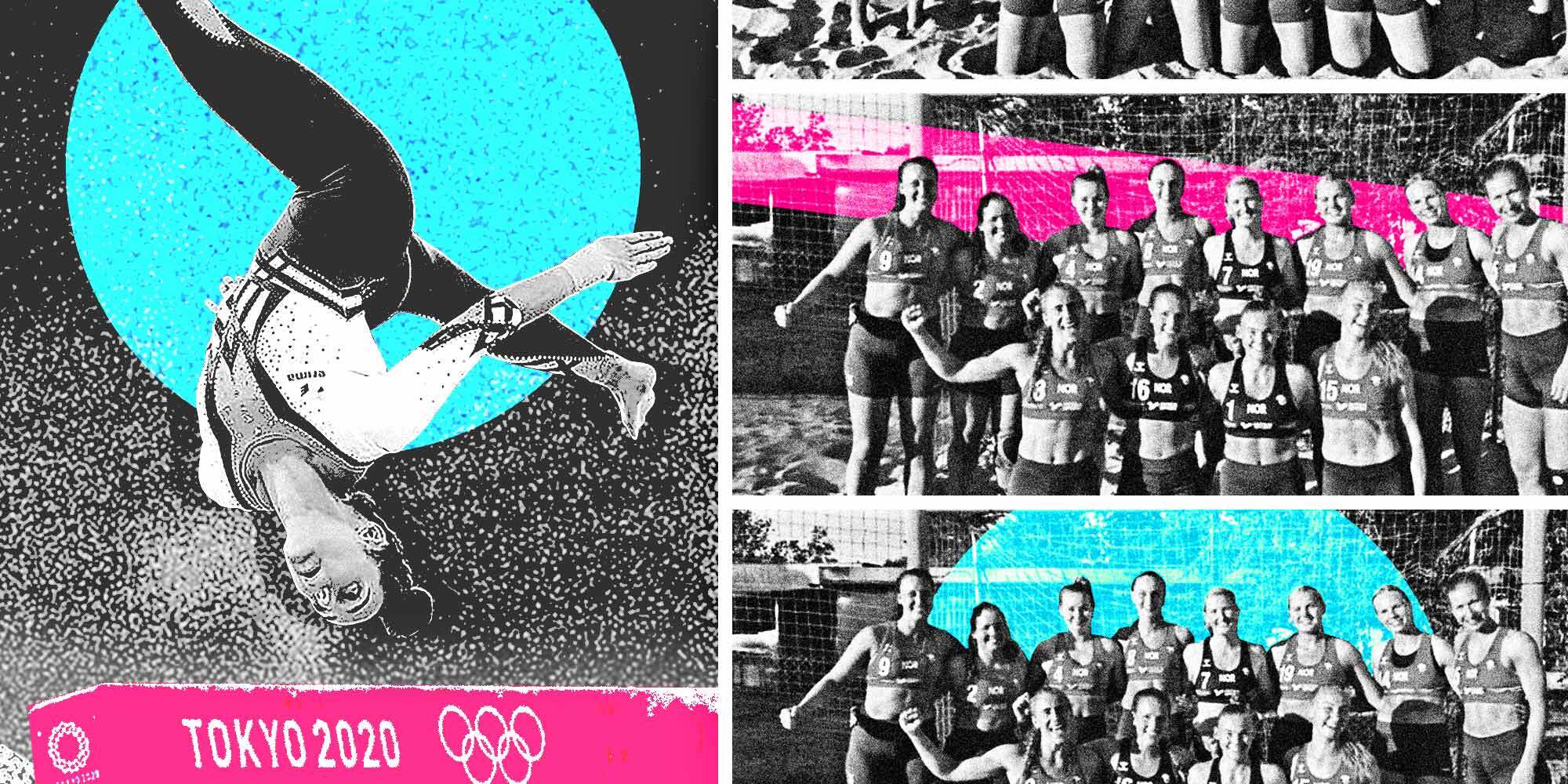In viral statements against being sexualized and uncomfortable, some Olympic and Euro tournament athletes have been opting for changes in their uniforms.
Keep in mind that the core of the issue, here, isn’t the uniforms—it’s our culture’s proclivity for sexualization and objectification.
Norwegian team fined for “improper clothing”
Last week, the Norwegian women’s beach handball team was fined for refusing to play in bikini bottoms during a game in the sport’s Euro 2021 tournament.
The team wore what they felt were more comfortable thigh-length elastic shorts during their bronze medal match against Spain in Bulgaria to protest against the regulation bikini-bottom design. The team was fined 1,500 euros total ($1,700) for “improper clothing,” according to a statement from the European Handball Association’s Disciplinary Commission.
While male players are allowed to play in tank tops and shorts no longer than four inches above the knee, women are required to wear midriff-baring tops and bikini bottoms “with a close fit and cut on an upward angle toward the top of the leg” and a maximum side width of 4 inches, according to International Handball Federation regulations. They cannot opt-out of the requirements, even if they feel uncomfortable or sexualized.
Norwegian women’s beach volleyball team is fined because they refuse to play in bikini (as prescribed by rules). Unbelievable. Other countries have also protested the rules to no avail. What do you think? #Norway #beachvolleyballwomen @HomeofHandball pic.twitter.com/BsVcOY6ba9
— Silvia Durand B. (@silviadurandb) July 20, 2021
But Norway’s beach handball team is not the only team making a statement about their uniforms on the global stage of elite-level athletics.
Related: How My Porn Habit Normalized Sexual Objectification
German women’s gymnastics opt for unitards
The German women’s gymnastics team has forgone bikini-cut unitards in favor of full-body versions at the Tokyo Olympics, in what the German Gymnastics Federation has branded a statement against “sexualization,” CNN reports.
The suits, which the team wore in their qualifications at the 2020 Tokyo Olympics on Sunday, cover the legs to the ankle and are in contrast to the high-cut leotards worn by many other female gymnasts at the Olympics.
View this post on Instagram
As the New York Times reported, when the four members of the German women’s gymnastics team walked onto the competition floor on Sunday evening wearing the unitards, they were setting an example for athletes “who may feel uncomfortable or even sexualized in normal suits.”
The Germans first competed in unitards at the European championships in April.
“Every gymnast should be able to decide in which type of suit she feels most comfortable,” one team member, Elisabeth Seitz, said at the time.
Note that men’s gymnastics teams have worn long pants and loose-fitting shirts since the 1896 Olympics in Athens when men’s artistic gymnastics debuted as the first major competition of its kind for the sport.
Let’s talk about this. Again, the problem isn’t the uniforms or attire for any particular sport. It’s the issue our culture has with rampant sexual objectification.
To be clear, no matter if someone is wearing a leotard or unitard, bikini bottoms or shorts, they do not deserve to be sexualized or objectified. But the fact that athletes feel these uniform statements are necessary says something less about athletic uniforms and more about our culture of objectification as a whole.
The unfortunate reality is that many individuals in our “pornified” society objectify other individuals, including professional athletes. But dehumanizing and objectifying someone is never acceptable for any reason.
Athletes are not bodies for consumption
Fight the New Drug’s mission is to educate on the impacts of pornography, including sexual objectification—one of the many negative byproducts of porn culture.
Sexual objectification occurs when people perceive others as sex objects, rather than complex human beings deserving of dignity and respect. In fact, in a review of research on sexual violence, two leading experts called sexual objectification the “common thread” that connects different forms of sexual violence.Gervais, S. J., & Eagan, S. (2017). Sexual objectification: The common thread connecting myriad forms of sexual violence against women. The American journal of orthopsychiatry, 87(3), 226–232. https://doi.org/10.1037/ort0000257Copy
Research consistently shows that porn can play a big role in teaching viewers to consume people as products for their own personal sexual satisfaction, which can ultimately have unhealthy consequences for individuals, relationships, and for the cultures in which we live.Skorska, M.N., Hodson, G., & Hoffarth, M.R. (2018). Experimental effects of degrading versus erotic pornography exposure in men on reactions toward women (objectification, sexism, discrimination). The Canadian Journal of Human Sexuality, 27, 261 - 276.Copy Seabrook, R. C., Ward, L. M., & Giaccardi, S. (2019). Less than human? Media use, objectification of women, and men’s acceptance of sexual aggression. Psychology of Violence, 9(5), 536-545. doi:10.1037/vio0000198Copy
While some may applaud this move for athletes to cover-up, consider why these statements are needed in our world today. Consider that young girls and women who are professional athletes have been primarily judged as bodies for consumption, and not as people with exceptional skill, talent, and value. Consider that men’s team uniforms are not scrutinized in the same way. Why is this?
Object to objectification
The unfortunate truth is that pornography adds to a sexually objectifying culture that dehumanizes people—especially women—and reduces them down to a collection of body parts to be viewed, and discarded.
In response to the global culture of objectification, many women like the Norwegian volleyball team as well as Germany’s Olympic women’s gymnastics team opt to make statements against sexualization. In an ideal world, they wouldn’t have to.
Related: How Porn Can Normalize Sexual Objectification
Ultimately, people are not products for consumption, no matter if they’re a professional athlete or a performer in a porn video.
According to Pornhub Insights, sports-related searches are popular on Pornhub year-round, but the Olympics dramatically increases the volume of searches for various games. During the 2016 summer Olympics, Pornhub reported that the most searched-for sport was “Volleyball,” followed by “Soccer/Football,” “Swimming” and “Gymnastics/Gymnast.”
A quick online search for “gymnast”-related porn yields countless results that sexualize young girls, romanticizes sexually abusive scenarios between coaches and underage athletes, and generally objectifies and degrades women of all ages who compete in all manner of sports.
The bottom line is that if we’re really going to tackle the issue of sexualization and objectification, especially of young girls and women, we need to be aware of all the places where this harmful culture is normalized, and even promoted.
Related: Report Says FBI And Olympics Organizations Knew Larry Nassar Abused Gymnasts And Didn’t Stop Him
The same issue that these athletes are speaking out against is hugely normalized for anyone with internet and access to free porn sites. How is this acceptable? This is why we’re speaking out and shining a light on the connection between porn and sexual objectification.
The collective private actions of millions affect the larger culture—objectifying others privately on our screens doesn’t inspire respect and dignity in public. Objectifying Olympic athletes, for example, doesn’t feed into a culture that is respectful and equitable. The private impacts the public—that’s how culture works. If we want a culture of true respect and equality, then we need to make sure we think about, talk about, and treat others as whole people—not as objects.
Sexual objectification is not sexy, and people aren’t products, period.

Your Support Matters Now More Than Ever
Most kids today are exposed to porn by the age of 12. By the time they’re teenagers, 75% of boys and 70% of girls have already viewed itRobb, M.B., & Mann, S. (2023). Teens and pornography. San Francisco, CA: Common Sense.Copy —often before they’ve had a single healthy conversation about it.
Even more concerning: over half of boys and nearly 40% of girls believe porn is a realistic depiction of sexMartellozzo, E., Monaghan, A., Adler, J. R., Davidson, J., Leyva, R., & Horvath, M. A. H. (2016). “I wasn’t sure it was normal to watch it”: A quantitative and qualitative examination of the impact of online pornography on the values, attitudes, beliefs and behaviours of children and young people. Middlesex University, NSPCC, & Office of the Children’s Commissioner.Copy . And among teens who have seen porn, more than 79% of teens use it to learn how to have sexRobb, M.B., & Mann, S. (2023). Teens and pornography. San Francisco, CA: Common Sense.Copy . That means millions of young people are getting sex ed from violent, degrading content, which becomes their baseline understanding of intimacy. Out of the most popular porn, 33%-88% of videos contain physical aggression and nonconsensual violence-related themesFritz, N., Malic, V., Paul, B., & Zhou, Y. (2020). A descriptive analysis of the types, targets, and relative frequency of aggression in mainstream pornography. Archives of Sexual Behavior, 49(8), 3041-3053. doi:10.1007/s10508-020-01773-0Copy Bridges et al., 2010, “Aggression and Sexual Behavior in Best-Selling Pornography Videos: A Content Analysis,” Violence Against Women.Copy .
From increasing rates of loneliness, depression, and self-doubt, to distorted views of sex, reduced relationship satisfaction, and riskier sexual behavior among teens, porn is impacting individuals, relationships, and society worldwideFight the New Drug. (2024, May). Get the Facts (Series of web articles). Fight the New Drug.Copy .
This is why Fight the New Drug exists—but we can’t do it without you.
Your donation directly fuels the creation of new educational resources, including our awareness-raising videos, podcasts, research-driven articles, engaging school presentations, and digital tools that reach youth where they are: online and in school. It equips individuals, parents, educators, and youth with trustworthy resources to start the conversation.
Will you join us? We’re grateful for whatever you can give—but a recurring donation makes the biggest difference. Every dollar directly supports our vital work, and every individual we reach decreases sexual exploitation. Let’s fight for real love:


